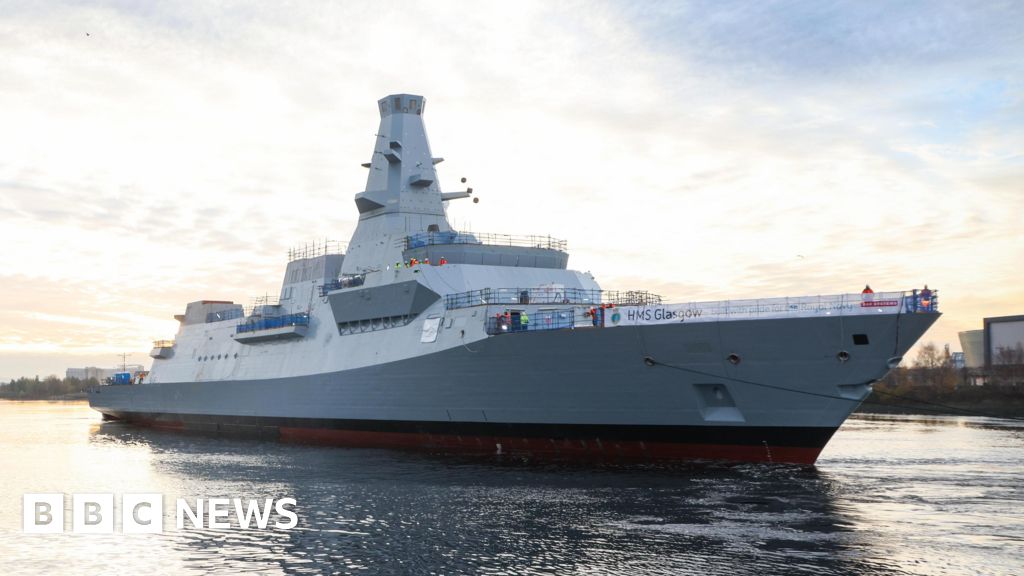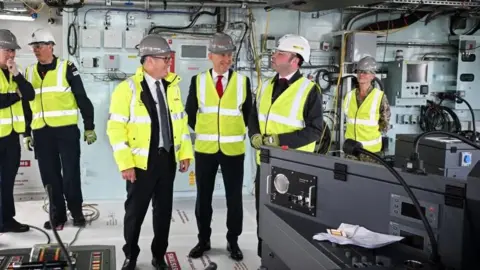Business
UK secures £10bn deal to supply Norway with warships

Jonathan BealeDefence correspondent and
Jessica RawnsleyBBC News
 UK MOD Crown Copyright
UK MOD Crown CopyrightThe UK has secured a £10bn deal to supply the Norwegian navy with at least five new warships.
The agreement to provide Type 26 frigates will be the UK’s “biggest ever warship export deal by value”, the Ministry of Defence (MoD) said, while Norway said it would be its largest “defence capability investment” to date.
The government said the deal would support 4,000 UK jobs “well into the 2030s”, including more than 2,000 at BAE Systems’ Glasgow shipyards where the frigates will be built.
UK Prime Minister Sir Keir Starmer said the agreement would “drive growth and protect national security for working people”.
“This success is testament to the thousands of people across the country who are not just delivering this next generation capabilities for our Armed Forces but also national security for the UK, our Norwegian partners and Nato for years to come,” he added.
The deal is also expected to support more than 400 British businesses, including 103 in Scotland, the MoD said.
Speaking to the BBC, defence minister Luke Pollard called it the “biggest British warship deal in history” and “a huge vote of confidence in British workers and the British defence industry”.
But the move was criticised by some in Norway, including Tor Ivar Strømmen, a naval captain at the Norwegian Naval Academy, who said French and German frigates were superior to British.
“The British Navy builds vessels for one role,” he told Norwegian outlet NRK. “It simply has old-fashioned and quite limited air defence.”
The agreement represents a victory for the British government and defence industry over France, Germany and the United States – which were also being considered by Norway as possible vendors.
It will create a combined UK-Norwegian fleet of 13 anti-submarine frigates – eight British and five Norwegian vessels – to operate jointly in northern Europe, significantly strengthening Nato’s northern flank.
The warships will be constructed at the BAE Systems yard in the Govan area of Glasgow, where frigates for the Royal Navy are currently being built.
Scottish Secretary Ian Murray said the choice of the UK “demonstrates the tremendous success of our shipbuilding industry and showcases the world-class skills and expertise of our workforce on the Clyde”.
Norway’s Prime Minister Jonas Gahr Støre, who informed Sir Keir of the decision to select the UK in a phone call on Saturday night, said the partnership “represents a historic strengthening of the defence cooperation between our two countries”.
Støre said the government had weighed two questions in its decision: “Who is our most strategic partner? And who has delivered the best frigates?… The answer to both is the United Kingdom.”
 PA Media
PA MediaThe Type 26 frigates purchased by the Royal Norwegian Navy will be as similar as possible to those used by their British counterparts, and have the same technical specifications.
They are specifically designed to detect, track, and destroy enemy submarines, with deliveries expected to begin in 2030.
UK Defence Secretary John Healey said the UK would “train, operate, deter, and – if necessary – fight together” under the defence deal.
“Our navies will work as one, leading the way in Nato, with this deal putting more world-class warships in the North Atlantic to hunt Russian submarines, protect our critical infrastructure, and keep both our nations secure,” he added.
Citing this year’s strategic defence review, Pollard said Russia had been identified “as the principal threat to not just the UK’s security but NATO’s security”.
“A key threat of that is Russian submarines in the North Atlantic,” he told the BBC. “These new Type 26 frigates are world-class submarine hunters.”
 PA Media
PA MediaEight Type 26 frigates are currently being built at BAE Systems’ Glasgow shipyards for the Royal Navy, to replace its ageing Type 23 frigates – whose service life has already had to be extended.
It is not yet clear how the Norway deal will impact the delivery of the new vessels to the Royal Navy.
A UK defence source said the plan was still to deliver all 8 Type 26 frigates to the Royal Navy within the next decade. Norway has said it wants its first Type 26 delivered by 2029.
British officials told the BBC that the sequencing of delivery for both Norway and the UK still had to be worked out.
Two of the warships, HMS Glasgow and HMS Cardiff, have been built and are currently being fitted out at a second BAE shipyard, Scotstoun. They are due to enter service in 2028.
Another three, HMS Belfast, HMS Birmingham and HMS Sheffield, are under construction.
BAE has also licensed the Type 26 design to Canada and is building the warships in Australia under contract.
As part of a £300m modernisation at BAE Systems, a new shipbuilding hall – dubbed the “frigate factory” – was opened earlier this year.
The Janet Harvey Hall, named after a pioneering female electrician, is large enough for two frigates to be built simultaneously.
The Royal Navy is also buying 5 new Type 31 General Purpose Frigates – which are being built at Rosyth.
Business
Greggs to reveal trading amid pressure from cost of living and weight loss drugs

Greggs is to shed light on demand from customers as the high street bakery chain contends with the rise of weight loss treatments and cost of living pressures on shoppers.
The high street chain is also wrestling with other factors including increases to labour costs and tax changes.
As a result, on Tuesday March 3, Greggs is expected to reveal pre-tax profits of around £173 million for the year to December 27, representing a 9% drop.
In its previous update shortly after Christmas, Greggs pointed to a strong finish to 2025 as sales growth accelerated in the final quarter of the year.
Like-for-like sales growth rose from 1.5% in the third quarter to 2.9% in the final months of 2025.
Totals sales were up 7.4% in the final quarter amid a boost from the group’s continued store opening programme.
The company opened 121 stores last year.
However, analysts at Deutsche Bank said expectations “have already been set low” for 2026 and are “unlikely to change”.
In January, Greggs said it was “cautious but hopeful” about its outlook for 2026, highlighting “subdued” consumer confidence.
Roisin Currie, chief executive of Greggs, also warned alongside its previous update that there was “no doubt” appetite-suppressing medication is having an impact on the bakery chain’s business.
It may provide more detail on how this continues to change customer eating habits.
Meanwhile, the group also announced that inflation was likely to be shallower than last year.
The group increased the price on a number of products and deals last year, so shareholders will also be keen to see how these changes have continued to impact trading.
Aarin Chiekrie, equity analyst at Hargreaves Lansdown, said: “Investors are keen to hear how 2026 is shaping up in the early months.
“While the picture on the cost front is beginning to look more favourable, Greggs has plenty of other challenges still to wrestle with.
“Unhelpful changes to tax rules and minimum wages, slowing UK economic growth, and cost-conscious consumers are all weighing on the outlook.”
Business
Chief of Staff of the Iranian Armed Forces Confirmed Martyred in US, Israeli Strikes – SUCH TV

Major General Seyed Abdolrahim Mousavi, the Chief of Staff of Iran’s Armed Forces, attained martyrdom in a cowardly Israeli-American aggression on Saturday.
Leader of the Islamic Revolution, Ayatollah Seyyed Ali Khamenei, was also martyred in the Saturday aggression, alongside many top-ranking military commanders and defense officials.
Major General Mousavi succeeded Major General Mohammad Bagheri following the 12-day war in June last year and carried forward the remarkable legacy of his predecessor.
He played a particularly vital role in the June 2025 war, leading the Iranian armed forces in their retaliatory operations that forced the Israeli regime to beg for surrender.
Mousavi previously served as the commander-in-chief of the Islamic Republic of Iran Army and played an instrumental role in bolstering the might of the army.
On August 21, 2017, he was promoted from Brigadier General to Major General and appointed Commander-in-Chief of the Islamic Republic of Iran Army by the Leader, replacing Seyed Ataollah Salehi.
Later, on May 28, 2019, Ayatollah Khamenei appointed him as the commander of the Khatam al-Anbia Air Defense Base, while he continued to serve as the army’s top commander.
Mousavi was born in 1960 in the holy city of Qom in central Iran. He was a graduate of the Army’s Ground Forces Officers’ University and held a doctorate in defense studies from the Supreme National Defense University. He joined the Iranian army in 1979.
During the years of the Imposed War in the 1980s, Major General Mousavi served in the Army’s artillery unit on various fronts, including the western battlefields in Kurdistan (28th Kurdistan Division) and the southwestern fronts (33rd Artillery Group of the Ground Forces) in Khuzestan province.
He participated in many operations such as Valfajr 4, Valfajr 9, Beit al-Moqaddas 5, Qader, Nasr, and several others. He is recognized as a veteran of the war.
After the Imposed War ended in 1997, he completed the Advanced Command and Staff Course (DAFOS) and later earned a doctoral degree in defense management at the Supreme National Defense University.
From 1999 to 2005, he served as the Chief of Joint Staff of the Army, and from 2008 to 2016, he was Deputy Commander-in-Chief of the Army. Following that, from 2016 to 2017, he held the position of Deputy Chief of Staff of the Armed Forces.
Mousavi held several significant leadership positions within Iran’s military. From 1999 to 2005, he served as the Chief of Joint Staff of the Army, later assuming the role of Deputy Commander-in-Chief from 2008 to 2016.
In 2016, he was appointed Deputy Chief of Staff of the Armed Forces, a position he held until 2017, when he was named Commander-in-Chief of the Islamic Republic of Iran Army, a role he held until today.
Additionally, since May 2019, served as the Commander of the Khatam al-Anbia Air Defense Base, further solidifying his central role in the country’s military strategy and operations.
Major General Mousavi also served as the Commander of Imam Ali (PBUH) Officers’ University, where he contributed to the training and development of military personnel.
He also led the Army’s Northeast Operational Base, overseeing strategic operations in the region.
In addition, he was the Deputy for Training and the Deputy for Planning and Programs within the Army Ground Forces, playing a key role in shaping military preparedness and strategy.
Mousavi’s expertise in operations led to his appointment as the Head of Operations for the Army, and later, he became the Director of the Army Strategic Studies Center, where he engaged in high-level research and policy development.
Business
Yorkshire Cat Rescue sees rise in abandoned cats as costs increase

Yorkshire Cat Rescue in Haworth says it paid £282,000 in vet bills in 2025 and rescued 925 animals.
Source link
-

 Business1 week ago
Business1 week agoUS Top Court Blocks Trump’s Tariff Orders: Does It Mean Zero Duties For Indian Goods?
-

 Fashion1 week ago
Fashion1 week agoICE cotton ticks higher on crude oil rally
-

 Entertainment1 week ago
Entertainment1 week agoThe White Lotus” creator Mike White reflects on his time on “Survivor
-

 Business1 week ago
Business1 week agoEye-popping rise in one year: Betting on just gold and silver for long-term wealth creation? Think again! – The Times of India
-

 Politics1 week ago
Politics1 week agoPakistan carries out precision strikes on seven militant hideouts in Afghanistan
-

 Sports1 week ago
Sports1 week agoBrett Favre blasts NFL for no longer appealing to ‘true’ fans: ‘There’s been a slight shift’
-

 Entertainment1 week ago
Entertainment1 week agoViral monkey Punch makes IKEA toy global sensation: Here’s what it costs
-

 Sports1 week ago
Sports1 week agoKansas’ Darryn Peterson misses most of 2nd half with cramping







